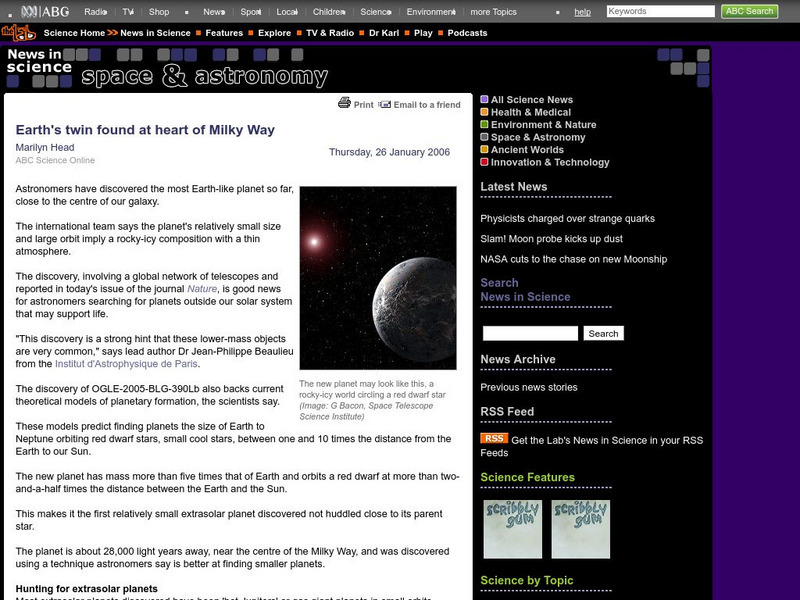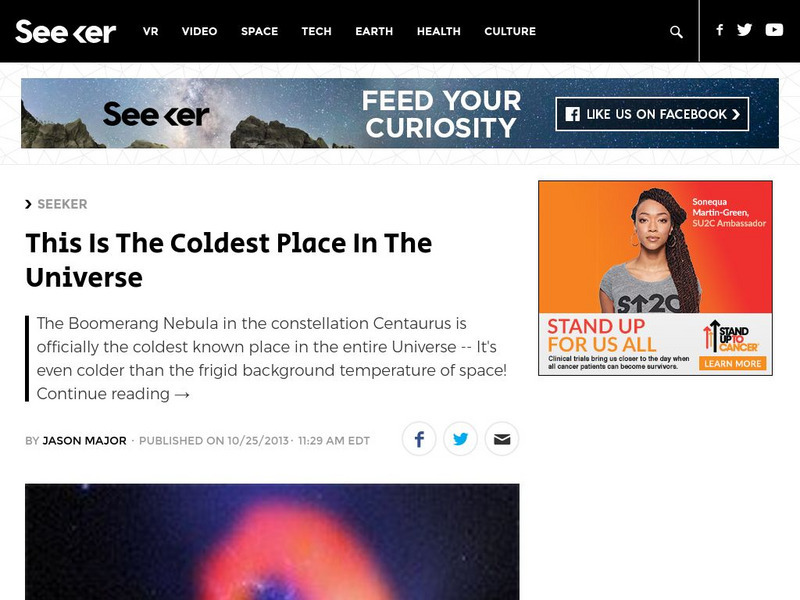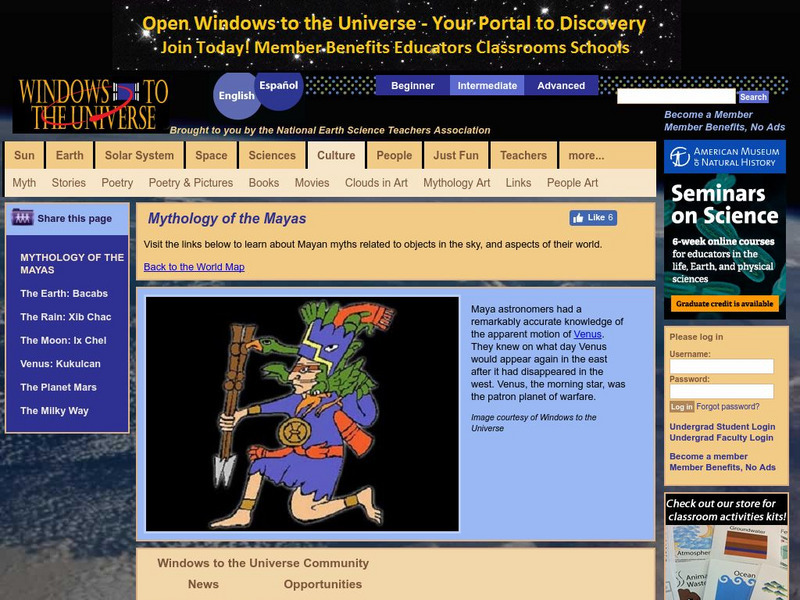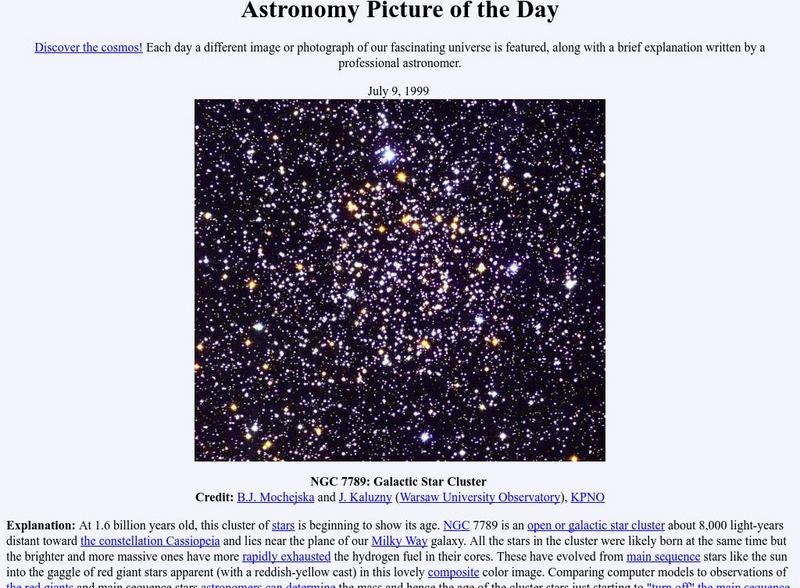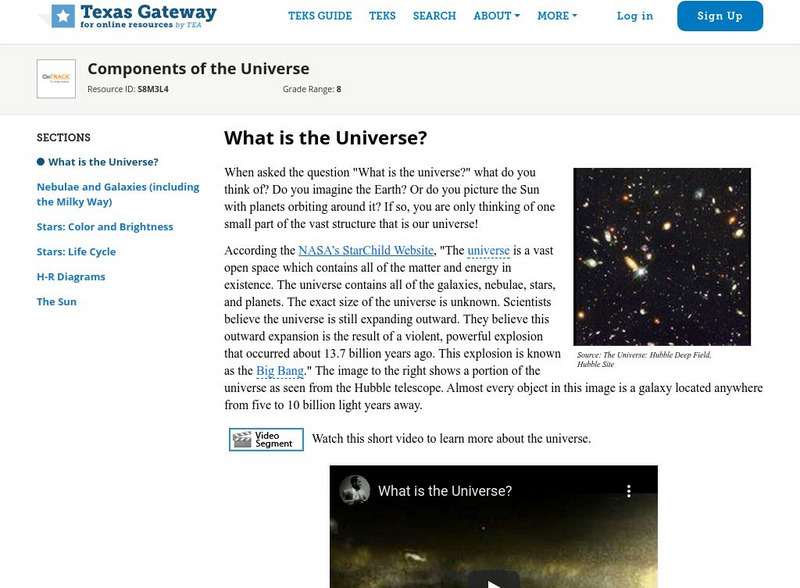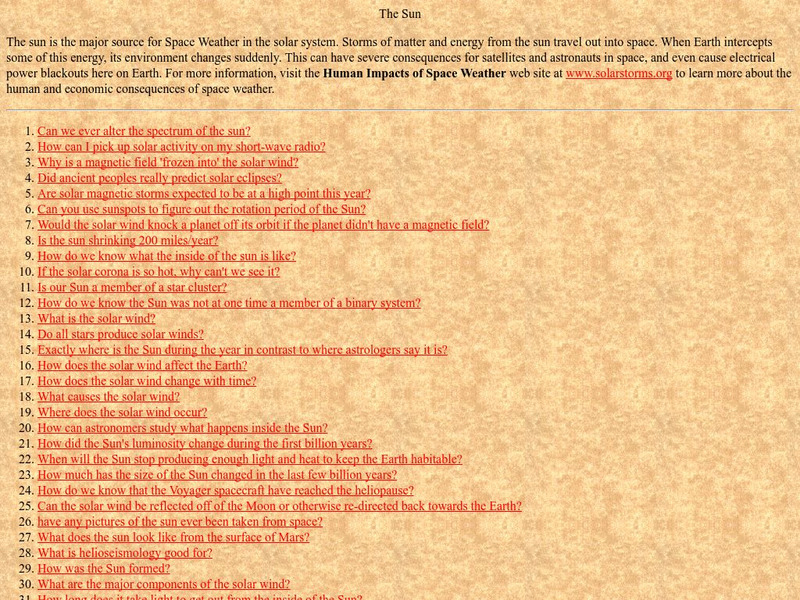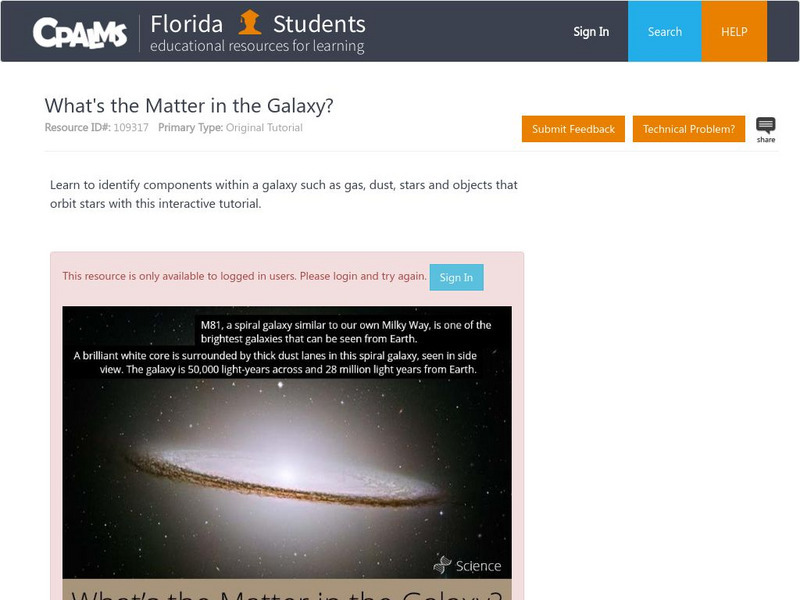Hi, what do you want to do?
Polk Brothers Foundation Center for Urban Education at DePaul University
De Paul University: Center for Urban Education: Learning About the Solar System [Pdf]
"Learning about the Solar System" is a one page, nonfiction, reading passage about the Milky Way gallaxy and what it takes to be a scientist. It is followed by constructed-response questions which require students to provide evidence...
A&E Television
History.com: The Space Race: Interactive Universe
A virtual journey through space offers photos and facts about Earth and its neighboring planets, comets, other celestial bodies of the Solar System, and the Milky Way and Andromeda galaxies.
Polk Brothers Foundation Center for Urban Education at DePaul University
De Paul University: Center for Urban Education: Learning About the Solar System [Pdf]
"Learning about the Solar System" is a one page, nonfiction, reading passage about the Milky Way gallaxy and how scientists learn about it over time. It is followed by questions which require students to provide evidence from the story;...
Australian Broadcasting Corporation
Australian Broadcasting Corporation: News in Science: Milky Way Is Many Tentacled Beast
From ABC News in Science, Larry O'Hanlon's article discusses research connected to the size of the Milky Way Galaxy. The article suggests that the galaxy, instead of being a neat spiral, stretches out through a series of arms.
Australian Broadcasting Corporation
Australian Broadcasting Corporation: News in Science: Earth's Twin Found at Heart of Milky Way
From ABC News in Science, Marilyn Head's article centers on research behind the discovery of the planet in the Milky Way which most closely resembles the planet Earth.
Other
An Atlas of the Universe
What does the universe look like? This website offers visitors a collection of images that serve as an "atlas" of our universe. See multiple charts showing the Earth's distance from the Sun and other stars, find helpful terms in a...
NASA
Nasa: Wilkinson Microwave Anisotropy Probe (Wmap): The Milky Way
Description of the three major components of the Milky Way galaxy as well as images and resources for further reading.
Seeker
Seeker: Week of 10 28 13: This Is the Coldest Place in the Universe
Article reports on the discovery by scientists that the Boomerang Nebula in the Milky Way is the coldest known place in space.
TED Talks
Ted: Ted Ed: Is There a Center of the Universe?
It's been a long road to the discovery that Earth is not the center of the Solar System, the Milky Way, or the universe; great thinkers from Aristotle to Bruno have grappled with it for millennia. But if we aren't at the center of the...
The National Gallery (UK)
National Gallery, London: Ite: 'The Origin of the Milky Way'
See an example of how one teacher used this painting by Tintoretto to inspire her students to write and draw.
National Gallery of Art
National Gallery of Art: The Fall of Phaeton
Young scholars will be introduced to the Greco-Roman myth of Phaeton and how he created the Milky Way galaxy by critically analyzing The Fall of Phaeton by Rubens. They will then create their own constellation to be displayed in a...
National Earth Science Teachers Association
Windows to the Universe: Mythology of the Mayas
This article from the Windows to the Universe gives information on Mayan myths related to the Earth, rain, the Moon, Venus, Mars, and the Milky Way. There are illustrations and explanations of vocabulary. Choose from beginner to advanced...
NASA
Nasa: Astronomy Picture of the Day: Giant Stars
Image of a group of red giant stars are seen in an image from the edge of the plane of the Milky Way. The evolution of these stars is explained. Many embedded links contained in the text to related topics.
Mocomi & Anibrain Digital Technologies
Mocomi: How Big Is the Universe?
Provides facts about the Universe, Jupiter, the Milky Way Galaxy, and Superclusters.
University of Wisconsin
University of Wisconsin: The Constellations and Their Stars
An excellent site dedicated to the constellations and information about the objects which make them up. Contains a great deal of information about various stars, galaxies and other objects, as well as details on how best to observe them.
Texas Education Agency
Texas Gateway: What Is the Universe?
The following tutorial is an explanation of what the universe is composed of.
NASA
Nasa: Image Science Center: Ask the Space Scientist
A NASA space scientist provides 98 questions and answers about the sun, the center of our solar system.
CPALMS
Florida State University Cpalms: Florida Students: What's the Matter in the Galaxy?
A tutorial that looks at the components within a galaxy such as gas, dust, stars and objects that orbit stars. A PDF file of the tutorial is available.
Enchanted Learning
Enchanted Learning: The Planets
This survey of the planets includes all the basics, size, mass, atmosphere, length of day, and the like. It features interactive activities and learning exercises and compares all of the planets in colorful tables.
American Museum of Natural History
American Museum of Natural History: Ology: What Do You Know About Stars?
Test your knowledge with this ten-question quiz on stars. Focusing on stars in the Milky Way galaxy, questions range from the life cycle of a star to the number of stars in our galaxy.
TED Talks
Ted: Ted Ed: Could Human Civilization Spread Across the Whole Galaxy?
Could human civilization eventually spread across the whole Milky Way galaxy? Could we move beyond our small, blue planet to establish colonies in the multitude of star systems out there? These questions are pretty daunting, but their...
Other
Joseph Bruchac Home Page: Joseph Bruchac
This site is Joseph Bruchac's homepage. It provides links to his biography, a listing of his major works, and other online resources for the author. It also provides links to several of his poems to open or download on mp3.
Polk Brothers Foundation Center for Urban Education at DePaul University
De Paul University: Center for Urban Education: Learning About the Solar System [Pdf]
"Learning about the Solar System" is a one page, nonfiction, reading passage about scientists and learning about our solar system and how it works. It is followed by constructed-response questions which require students to provide...





![De Paul University: Center for Urban Education: Learning About the Solar System [Pdf] Unit Plan De Paul University: Center for Urban Education: Learning About the Solar System [Pdf] Unit Plan](https://static.lp.lexp.cloud/images/attachment_defaults/resource/large/FPO-knovation.png)


